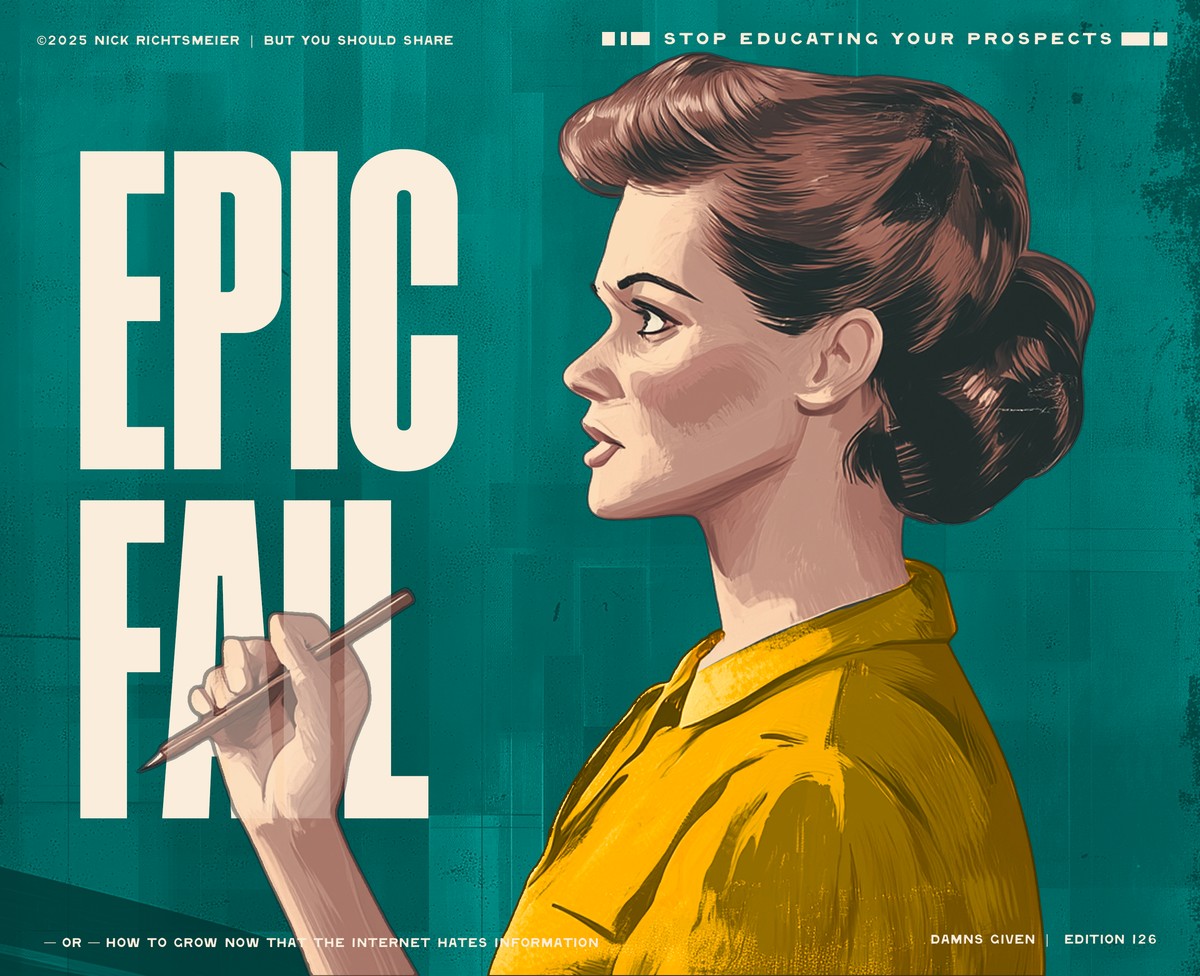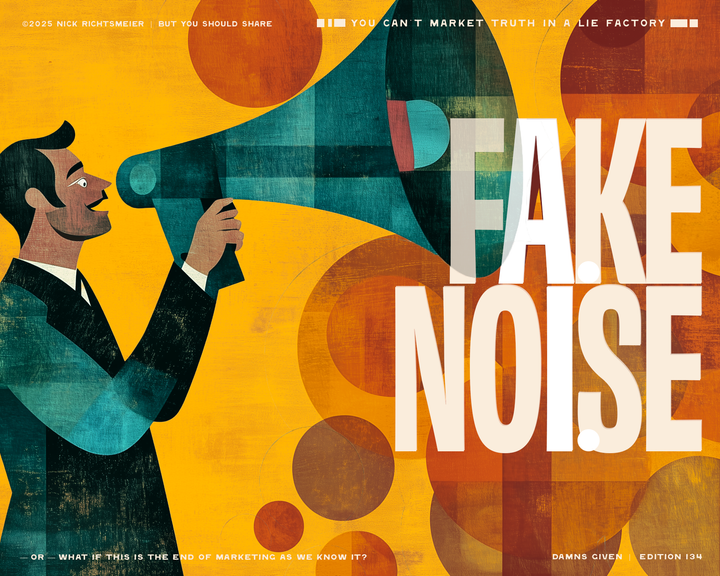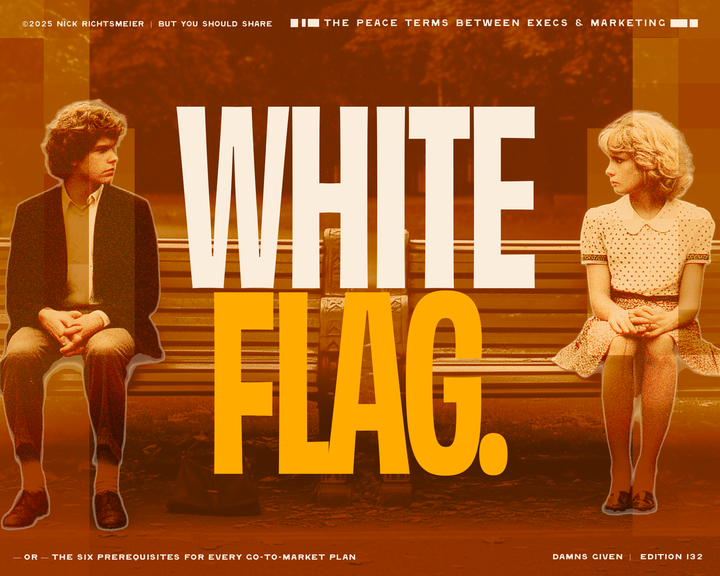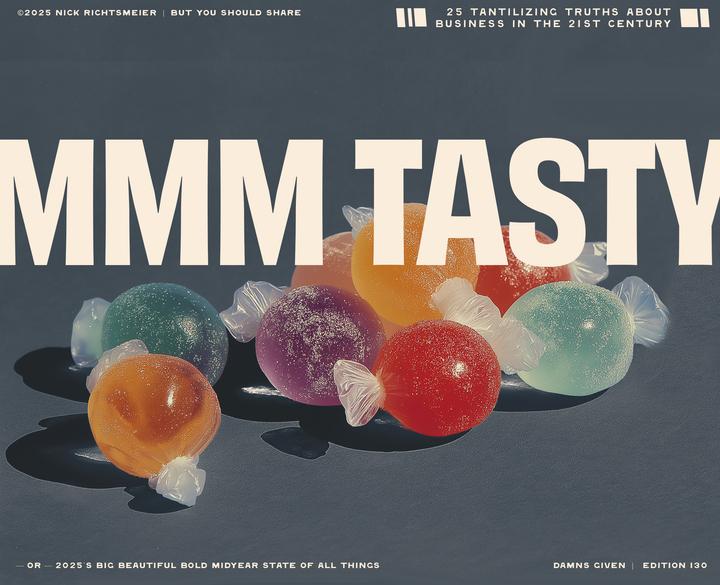Stop Educating Your Prospects
The initial dream of the internet was a sharing of information. Too bad that's over. This essay is about eating my own cooking, serving it to you, and doing what's necessary now.

FWD 126 – OR – How to grow now that the Internet hates information
Well, maybe you missed me. It's been almost sixty days since my last missive, and since we've last been together, I have gazed in the navel and found the center of the universe. Not really, but close. I took a step back, met with about 20 people to get some feedback and went viral on the internet.
Today's Edition dives us back in together. It's the product of me eating my own cooking. Nick lessons I'm following:
- Do Less. This is now a singular newsletter. One time a week max. No offshoots.
- Focus your Voice. I'm here to compost the parasites that are devouring your business in this economy of extraction. That's what we're going to do here and we're going to have as much fun as possible doing it. Get back to trust and what's killing it.
- Stop Educating. You have no shortage of places to be dog-walked into the best ideas to tweak the paint job on various growth strategy sinking ships. Let's dig in.
Education is on hard times. Harvard, Columbia, your local public school, and everything in between. But surrounding the institutional crisis (which is not the focus of this newsletter) is not the bigger story. At large, is a mass shift in culture, driven by the internet economy (now an extraction economy), which has completely shifted the appetites of the exact people you are hoping to buy from you.
The initial dream of the internet was a sharing of information. This was accelerated by the content marketing/blogging era where all you had to do was put a "How To" blog on the internet every couple weeks and the lead forms would pop off faster than a pre-teen watching YouTube Shorts.
What a magical time.
Then came the engagement algorithm and AI overlay. Remember when the main thing you would see on social is the people you knew well? If your best friend posted pics of her kids, they would show up at the top of your feed? Now what's at the top? "Recommended" posts. What's at the top of the Gemini Highlight? The most educational content? No, an AI summary full of hallucinations and some links to a whackadoo thread from 2018 Reddit.
The web is not an educational place. It is—as internet mogul John Green has said— "a trust-destroying machine."
And yet, brands continue to pay ridiculous sums producing educational content, building out "explainers" and pumping their podcast feeds full of "here's how to do this complicated thing, but if you don't want to do this hard thing yourself, then you can hire us to do it."
Their marketing firms convince them to tweak the edges, switch keyword sets, change the graphic, or change the color of the action button, as if it were 2016 and Hubspot was still the most powerful marketing engine in the world rather than the shell it's become.
We are Post-Content
My content marketing friends get real mad at me when I say this, but it's true. Simply putting words in sequence and posting them online is about as likely to make you money as painting your house purple. (The house painting might actually be more effective.)
Corporate social media feeds are about as useful as fishnet swimming shorts.
"Resources" pages on websites are full of unread articles that had to touch ten different people, hand-wrung by Subject Matter Experts (SMEs) and blown up at the last minute by a neurotic founder CEO who can't let anything out the door without rewriting it. Thousands of dollars of manhours spent.
Change out the logo on nearly anything you read and you wouldn't know the difference.
Americans are in their zone-out era, wanting to take in as little big ideas as possible because every single one is a reminder of how complicated, scary, and impossible to manage the world is becoming.
When we share internet content, it's not recipes or how-to videos. We're in the meme culture now. And very few companies are competent to communicate value and interest in memes.
Death to the "Educator" Brand
"We just need to educate our prospects." As soon as you find these words coming out of your mouth, just cash out 2-5% of your revenue and light it on fire.
No one wants to be educated. They don't want to be advised on the internet. Even the subset of you that are still reading this newsletter are not here to have things explained to you. If you are, the misinformation of ChadGPT and his brother Claude and dog, Gemini, are RICHT THERE.
You know you can trust me to deliver the spice, to call out the BS, to offer a different way in the world than the one you've been given. We are mapmaking here, exploring it and enjoying it are up to you. What I know from the many comments we get back from this newsletter is never "Nick gave us great tips." It's "Nick educated me on how the internet works." It's "Nick says what everybody feels like they know but no one else will say."
I'm not here to educate. For that you can pay me money.
I'm here to provoke, inspire, make you question, make you laugh, and make you wonder... do I want this brain (Nick's brain) in the room when I make my next decision?
I'm never gonna earn that place by writing how-to blogs. And neither are you.
The Brands in a Post-Trust World
"So, Nick, what else should we do?" Ah yes, bait me into educating you on other options so that you can call me a hypocrite on the internet. How dare you.
And yet, I can't leave you with just the extraction of the content marketing ecosystem. A brand that wants to make money in the next 12-36 months will pivot from the tired, contrived, condescending "educator" brand and into one of three archetypes we've surfaced through our research:
The Neighbor: The Neighbor takes the "good intentions" energy of the Educator and builds a voice and a platform as the most reliable member of the community. They know everyone. They quietly provide value all over the place with low splash and high impact. They have the best recipes, but don't promote them. They have a deep network of partners, generate referrals easily, and know all the local hot spots. They claim a very specific community and are intent on making the best place in the world to live.
The Prophet: The Prophet takes the "we have something to say" energy of the Educator and ups the ante. The Prophet pulls back the curtain on flailing industries. Calls out the bullshit of the incumbents. Evangelizes aggressively about what is wrong with the world and how the names you recognize are complicit. They aren't here to make the world burn; they are here for freedom. The path to freedom isn't more information, it's a clear vision. And they earn every client through vision and creating culture.
The Muse: The Muse takes the inspirational intentions of the Educator and models the way. The Muse has a DEEP POV, which sounds odd against the grey background of "normal." The Muse Brand voice is the only way to stay in the "make media" content game. But it's not "content." It's inspiration, it's great stories, it's beautiful, contrasting, and its ability to call out the best in us is the reason clients keep showing up.
What you'll notice about these three personas is their ability to either circumvent or maximize the rules of the internet. The Neighbor is beyond the Internet. It is a way of showing up in the world that thrives off line, but is willing to live here to find you and invite you over for supper to talk about what really matters. Think Patagonia.
The Prophet brand calls out the bullshit, whose grifting off the degradation of value in any given category, and invites the prospect into a new religion that breaks you free from the chaos other lesser brands are willing to inflict on you. Think 1980s Apple.
The Muse brand knows that the internet is a place for entertainment and while value can be had for purchasers and clients, the purpose of the brand online is keep you engaged. Think pre-AI meltdown Duolingo.
You've got to pick one, or you'll end up in that mushy middle. We can help you find the right one for you and how to adjust your strategy to capitalize on it.
I'm building my network of founders, creatives, and people committed to fixing this extractive mess that's been made for us. If that's you, let's have a little coffee talk.



